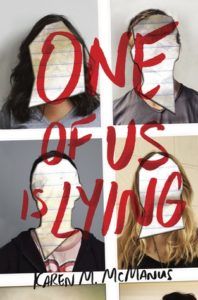
Why ONE OF US IS LYING by Karen McManus is Problematic
It’s easy to see why Karen McManus’s debut novel, One of Us is Lying, has been popular since its debut in 2017. Described as The Breakfast Club meets Pretty Little Liars, One of Us is Lying is the story of five teens from different social groups who wind up in detention under mysterious circumstances. Before they’ve had a chance to settle in for the afternoon, one student winds up dead.
 What follows is an addictive read; a murder mystery where everyone has motive and you can’t rule out anyone. Combine secret romances, shoddy police work, and juicy gossip with the fast-paced plot rife with surprises, and it’s no wonder the book spent 79 weeks on The New York Times bestseller list. And it’s likely to make its way back to that list once its sequel, One of Us is Next, is published in January 2020. One of Us is Lying is a fun read that touches on many social issues facing teens today. So what’s the problem with the gossipy drama? While it touches on worthy issues, it rarely sees them through.
What follows is an addictive read; a murder mystery where everyone has motive and you can’t rule out anyone. Combine secret romances, shoddy police work, and juicy gossip with the fast-paced plot rife with surprises, and it’s no wonder the book spent 79 weeks on The New York Times bestseller list. And it’s likely to make its way back to that list once its sequel, One of Us is Next, is published in January 2020. One of Us is Lying is a fun read that touches on many social issues facing teens today. So what’s the problem with the gossipy drama? While it touches on worthy issues, it rarely sees them through.
Below are major spoilers for One of Us is Lying. Don’t continue if you haven’t read the book!
Tired Cliches
Ok, this isn’t so much problematic as just worn-out: the main characters begin as boring teen stereotypes. Here’s how the book describes them:
Bronwyn, the brain, is Yale-bound and never breaks a rule.
Addy, the beauty, is the picture-perfect homecoming princess.
Nate, the criminal, is already on probation for dealing.
Cooper, the athlete, is the all-star baseball pitcher.
And Simon, the outcast, is the creator of Bayview High’s notorious gossip app.
Got it, so this is The Breakfast Club with a little murder thrown in. That’s actually not that far off, since McManus has stated she drew inspiration from the beloved ’80s film. My problem is that each kid’s secrets really aren’t that surprising, especially given the teen tropes. Bronwyn never breaks a rule? You’ll be shocked to learn she has—and it involved her grades! Addy’s picture-perfect? Guess what, she’s not! Nate’s a bad boy on probation? Well he *secretly* has a heart of gold! I’ll cover Cooper and Simon’s secrets separately, because I think the book does a disservice to their characters.
Using Sexuality as a Plot Point
Here’s Cooper’s big reveal: the All-American, golden boy athlete is (gasp!) gay. My problem is not his sexuality. It’s important that literature reflects society; there should be more GLBTIQQ+ characters in mainstream literature. I thought McManus did a great job showing Cooper’s struggle with coming out to his family and friends, and how his relationships changed as a result. But while the other main characters’ secrets were hinted at or plainly stated relatively early in the book, Cooper’s was saved as some type of big “gotcha” reveal. Like it’s still shocking that great athletes might also not be straight. I just don’t think sexuality should be used as a plot point. And the reveal of Cooper’s secret felt somehow larger than the reveal of the murderer.
Still, my biggest problem with the use of Cooper’s sexuality is that he’s publicly outed during the police investigation and taunted in a pretty dramatic way. The police find out that Simon was planning on using his gossip app to out Cooper, making him the prime murder suspect. When Cooper doesn’t confess, detectives start grilling his classmates for information about his sexuality, thereby outing the teen. As if that’s not bad enough, the murder has attracted national interest, so Cooper’s not just outed to his peers, but in the national news. Most of the college baseball programs that had been begging for Cooper’s consideration suddenly aren’t that interested in signing a gay pitcher. Oh, and when his classmates learn he’s gay? He’s pelted with condoms in front of the packed lunch crowd.
This is all pretty traumatic stuff. Readers don’t know it’s coming and what’s more, it’s really not dealt with. Yes, Cooper’s distraught when he realizes he’s about to be publicly outed and his conservative father takes time coming around, but there’s almost no discussion about the lunch scene. Cooper still shows up to baseball practice, ready to prove himself to scouts. It’s like Good Guy Cooper doesn’t really need time to process what would be incredibly traumatic for anyone else.
Depression is the Villain
Simon’s secret is that he was depressed, suicidal, and actually masterminded his own death. Simon wanted the notoriety of a school shooter but also wanted others to appreciate his genius. By framing the teens for his murder, he planned to ruin their lives while also taking his own.
There’s also a secondary character who suffers from depression. And she’s also revealed to be involved with the framing plot. It’s an interesting angle for a murder mystery—but do we really need to see the characters with mental health problems as the villains?
Not everyone who is depressed will die by suicide or cause harm to others. The way depression is handled feels cavalier. Given that the book is targeted to teens, it just feels wrong.
The characters ultimately see Simon as just a sick kid, so it’s the depression that gets demonized in the end. Maybe this circles back to my previous point about how literature should reflect our society; maybe McManus was trying to show us that lots of teens struggle with depression. And they do. But they don’t always turn out to be killers.
Slut-Shaming
Addy begins the book as one-half of the school’s most popular couple—a pretty, shallow girl whose self-worth is tied up in her relationship. As the book progresses, she comes into her own and ends up with one of the best character arcs in the book.
So, her secret is that she cheated on her boyfriend. Once. The level of slut-shaming, both from Addy’s deeply remorseful perspective and that of the other teens, was intense. And it wasn’t really challenged, either. I kept waiting for the moment when the slut-shaming would be addressed—but it wasn’t.
One of Us is Lying touches on several important subjects, like sexuality and mental illness. But I don’t know if it does them justice. It’s a fun, fast-paced read that gets a lot right. Hopefully, its sequel, One of Us is Next, delivers an entertaining story that avoids these pitfalls.













